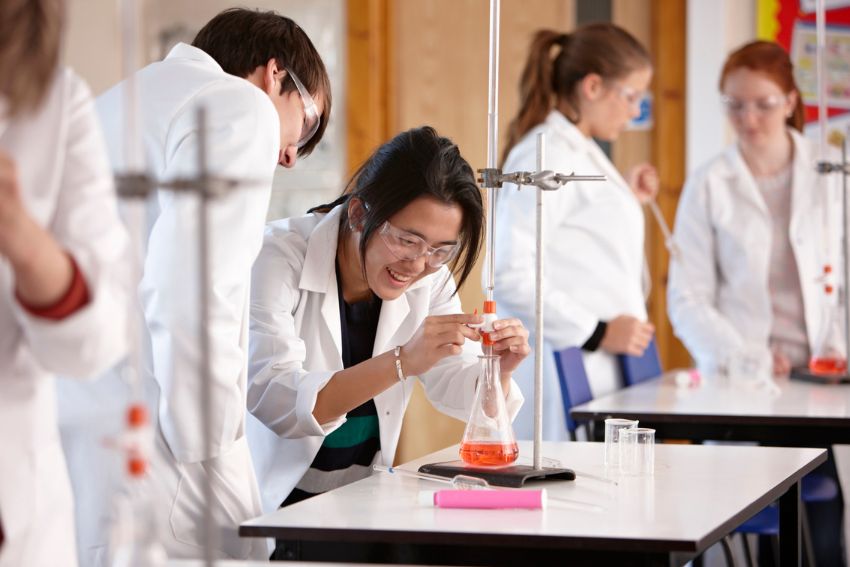GCSE Physical Education – Everything You Need To Know
GCSE Physical Education (PE) is an exciting and active subject that seamlessly combines theory with practical skills. Furthermore, students delve into the science behind physical activity, exploring how it directly impacts health and performance.
Key topics, such as anatomy, physiology, and sports psychology, provide a strong foundation for understanding these concepts. Additionally, the course includes practical assessments in various sports, ensuring a well-rounded learning experience. Consequently, it offers a balanced mix of academic knowledge and engaging physical activities.
Key Skills Developed Through Studying PE
GCSE PE helps students develop useful skills, such as:
- Analytical Thinking: Learning how the body and mind work in sports.
- Problem-Solving: Finding ways to improve performance.
- Teamwork and Leadership: Working together during practical activities.
- Communication Skills: Explaining ideas clearly in lessons and assessments.
- Time Management: Balancing practice and study.
- Resilience and Discipline: Staying committed to regular training and learning.
Why GCSE PE Is Important for Students
GCSE PE is more than just a school subject. It teaches the value of a healthy lifestyle. Students learn how physical activity improves both body and mind. This subject encourages habits that support lifelong health and well-being.
It also opens paths to further study and careers, like sports science, physiotherapy, or fitness coaching. For students who love sports or want a balanced education, GCSE PE is an ideal choice. It combines knowledge and practice, building skills that go beyond the classroom.
GCSE PE Syllabus Breakdown
The GCSE Physical Education (PE) syllabus, therefore, offers a well-rounded blend of theoretical knowledge and practical skills. It is specifically aimed at developing a deep understanding of physical activity and its wider implications. Consequently, here’s an overview of the key topics covered.
Topics Covered in the Curriculum
- Anatomy and Physiology
- The structure and function of the musculoskeletal and cardiovascular systems.
- How the body responds to exercise and recovers after physical activity.
- The role of energy systems in sports performance.
- Physical Training
- Principles of training and their application to improve fitness.
- Components of fitness such as strength, flexibility, and endurance.
- Preventing injuries and ensuring safe participation in physical activity.
- Socio-Cultural Influences
- The impact of social and cultural factors on participation in sports.
- Ethical considerations, such as the use of performance-enhancing drugs.
- The role of media, sponsorship, and global sporting events.
- Health, Fitness, and Well-being
- The importance of physical activity for maintaining a healthy lifestyle.
- Mental, emotional, and social benefits of regular exercise.
- Understanding dietary needs and nutrition for optimal performance.
- Practical Performance
- Assessments in at least three physical activities, covering both individual and team sports.
- Evaluating and analysing personal performance to identify areas for improvement.
- Application of theoretical knowledge in real-world scenarios.
Importance of Understanding the Specification for Your Exam Board (AQA, Edexcel, OCR)
Each exam board has specific requirements and focuses; therefore, these influence how the GCSE PE course is delivered and assessed. Consequently, understanding your exam board’s specification is crucial for targeted revision and success. For example:
- AQA: Focuses on the interplay between theory and practical elements, with an emphasis on analysing and evaluating performance.
- Edexcel: Offers a detailed breakdown of physical, social, and psychological aspects of sports and exercise.
- OCR: Places additional weight on theoretical knowledge and scientific principles underpinning physical performance.
By familiarising yourself with the syllabus from your exam board, you can tailor your preparation to meet their expectations, ensuring no topic is overlooked. This focused approach not only boosts confidence but also improves performance in exams and assessments.
Strategies for an Effective Revision
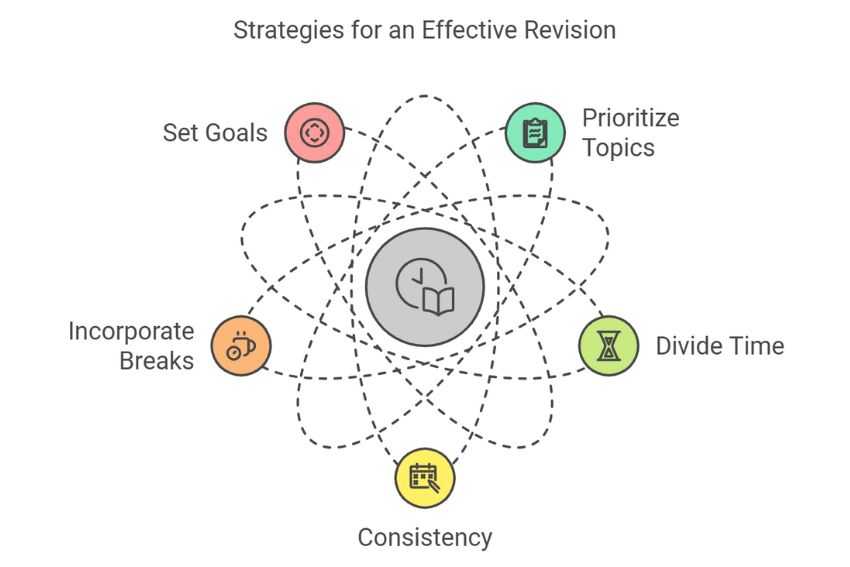
1. Prioritise Topics
Start by identifying the areas where you struggle the most. This could be complex topics like anatomy and physiology or abstract concepts such as socio-cultural influences. Therefore, Focus your initial revision sessions on these areas to build confidence and a solid foundation. Use tools like past papers or self-assessment quizzes to pinpoint weaknesses. Prioritising challenging topics early ensures you have ample time to revisit them later, reinforcing your understanding.
2. Divide Time
Allocate specific time blocks for theory and practical components. For example:
- Spend an hour revising theoretical topics like the principles of training.
- Follow this with 30 minutes reviewing practical performance strategies, such as improving your skills in assessed sports.
This balance ensures that both elements of the course receive adequate attention, which is essential since they are equally weighted in the final assessment.
3. Consistency is Key
Avoid the temptation to cram all your revision into a few long sessions. Instead, aim for short, focused study periods of 25–50 minutes daily, following the Pomodoro Technique or a similar method. Regular, consistent study helps retain information better and reduces stress. Review previously covered topics briefly before moving on to new ones to consolidate your learning over time.
4. Incorporate Breaks
Taking regular breaks is essential for maintaining concentration and avoiding burnout. After every 25–50 minutes of study, take a 5–10-minute break to relax and recharge. During this time, try:
- Going for a short walk.
- Doing a quick physical activity to stay active (linking theory to practice!).
- Hydrating or having a healthy snack.
These breaks refresh your mind, allowing you to return to your revision with renewed focus.
5. Set Goals
Clear, achievable goals for each study session keep you motivated and on track. Examples include:
- Completing one section of revision notes on health and well-being.
- Answering 10 past paper questions on physical training.
- Creating flashcards for key terms in socio-cultural influences.
Setting measurable objectives ensures progress, boosts confidence, and helps you stay accountable. Tick off each goal as you achieve it to track your progress and feel a sense of accomplishment.
Practice Questions and Past Papers
Practising exam questions and working through past papers is one of the most effective ways to prepare for GCSE Physical Education. This approach not only strengthens your understanding of key topics but also helps you become familiar with the exam format and question styles.
Why Practising Exam Questions is Essential
Practising exam questions plays a crucial role in GCSE PE preparation for several reasons
- Familiarity with the Exam Format: Repeated practice helps you understand how questions are structured and what examiners expect in your answers.
- Identifying Weak Areas: Regular practice highlights topics where you need improvement, allowing you to focus your revision effectively.
- Improving Time Management: Answering timed questions prepares you to complete your paper within the given duration.
- Building Confidence: Familiarity with the types of questions reduces exam-day anxiety and boosts confidence.
- Developing Exam Techniques: Practising how to interpret command words (e.g., “explain”, “evaluate”) helps you write concise, relevant answers.
How to Use Past Papers Effectively
Maximise the benefits of past papers with these strategies
- Simulate Exam Conditions: Attempt papers in a quiet environment, sticking to the allocated time, to mimic the exam experience.
- Review the Mark Scheme: First, check your answers against the mark scheme to clearly understand how marks are awarded. Then, identify areas where improvements are needed to refine your approach further.
- Analyse Patterns: Moreover, look for recurring themes or question types in past papers, and as a result, ensure you’re confident in these areas.
- Target Weak Topics: To begin with, use your past paper results to pinpoint weak areas. Then, dedicate additional time to revising those topics, ensuring steady improvement.
- Practice Regularly: By incorporating past papers into your revision schedule every week, you can steadily enhance your performance and build confidence over time.
- Review Incorrect Answers: Understand where you went wrong and revise those concepts thoroughly to avoid repeating mistakes.
Exam Boards Past Papers
Edexcel: Edexcel GCSE PE Past Papers
Top Tips for Achieving High Grades in GCSE PE
Excelling in GCSE Physical Education not only requires a mix of strategic preparation but also relies on using effective tools and maintaining consistent motivation. Therefore, here are some top tips to help you achieve high grades.
1. Developing Strong Exam Techniques
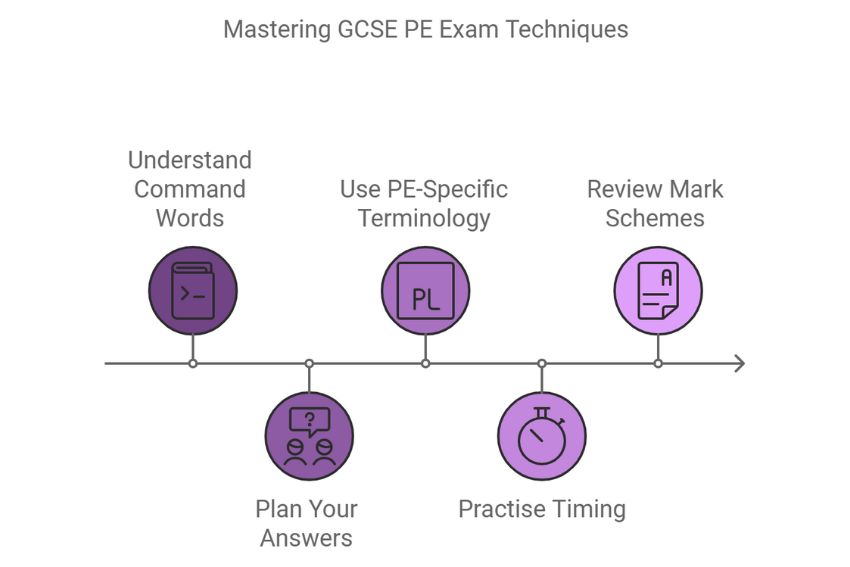
Mastering exam techniques is essential for showcasing your knowledge effectively during the exam
- Understand Command Words: Learn how to respond to specific command words such as “explain,” “evaluate,” or “compare.” Tailor your answers accordingly.
- Plan Your Answers: For longer questions, spend a few moments outlining your response to ensure it’s well-structured and hits key points.
- Use PE-Specific Terminology: Incorporate correct technical terms, such as “cardiovascular endurance” or “aerobic respiration,” to demonstrate subject knowledge.
- Practise Timing: Work on completing exam questions within the allocated time to avoid rushing through your answers.
- Review Mark Schemes: Study past papers and mark schemes to understand what examiners look for in high-scoring responses.
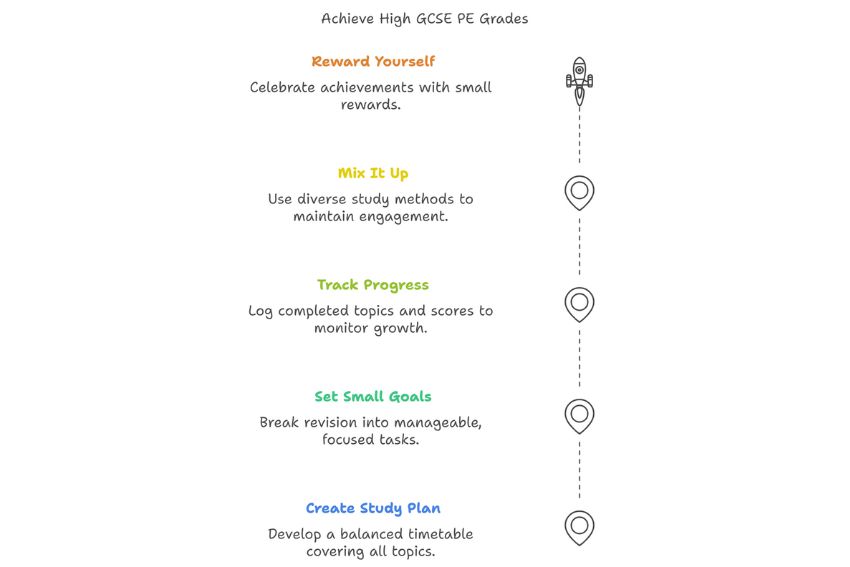
2. Staying Organised and Motivated
Organisation and motivation are key to maintaining steady progress throughout your GCSE PE journey:
- Create a Study Plan: Use a revision timetable to ensure all topics are covered and balanced between theory and practical elements.
- Set Small Goals: Break your revision into manageable chunks. For example, focus on mastering one topic, like “muscle groups,” in a single session.
- Track Progress: Keep a log of completed topics, mock exam scores, and areas for improvement to stay motivated by seeing your growth.
- Mix It Up: Avoid monotony by alternating study methods—switch between watching videos, taking quizzes, and revising from notes.
- Reward Yourself: Set up small rewards for achieving study goals, like taking a break or enjoying a favourite activity.
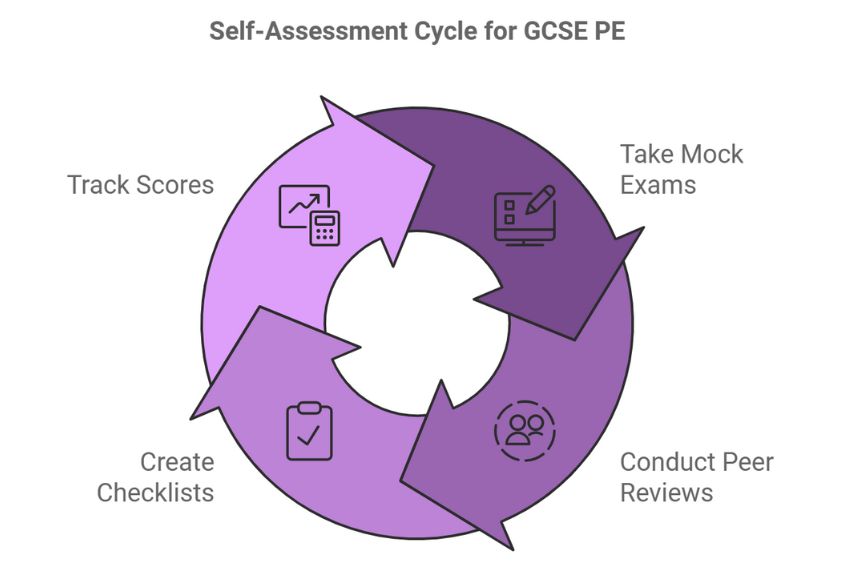
3. Practise Regular Self-Assessment
Regularly evaluating your progress helps you stay on track and identify areas that need improvement:
- Mock Exams: Take timed mock exams using past papers to simulate the real test environment. This builds confidence and highlights areas to refine.
- Peer Reviews: Study with friends or classmates and exchange answers to gain different perspectives on how to tackle questions effectively.
- Create Checklists: Develop topic-specific checklists to ensure you’ve covered all the required knowledge, from anatomy to socio-cultural influences.
- Track Your Scores: Maintain a record of your practice scores and aim for consistent improvement. Seeing your progress will boost motivation and highlight your strengths.
Self-assessment not only ensures thorough preparation but also instils a sense of accountability and focus, critical for achieving top grades.
Conclusion
GCSE Physical Education is a subject that goes beyond the classroom, combining theoretical knowledge with practical application to develop essential skills for both academic and personal growth. Whether it’s understanding the science behind physical activity, refining exam techniques, or excelling in practical performance, GCSE PE offers students a unique opportunity to explore the connections between health, fitness, and success. To find out more about GCSE check out our blog – GCSEs Everything you need to know.
By using effective revision strategies, practising past papers, and staying organised and motivated, students can confidently navigate the challenges of this subject and achieve high grades. With the right approach and dedication, GCSE PE can open doors to further education, exciting career opportunities, and a lifelong appreciation for the benefits of physical activity.
FAQs
What is the structure of the GCSE PE course?
The course typically comprises both theoretical and practical components. The theory portion covers topics like anatomy, physiology, and socio-cultural influences, while the practical aspect involves performance in selected physical activities. The exact structure may vary depending on the exam board.
How is GCSE PE assessed?
Assessment usually includes written examinations for the theoretical content and practical evaluations of performance in chosen sports. Additionally, there may be coursework elements, such as a Personal Exercise Plan (PEP).
Which sports can I be assessed in for the practical component?
A range of individual and team sports are available for assessment. The specific list varies by exam board but often includes activities like football, basketball, athletics, and swimming. Therefore, It’s important to consult your exam board’s specification for the approved list.
Can I be assessed in a sport I participate in outside of school?
Yes, if the sport is on the approved list, you can be assessed in it. However, you’ll need to provide video evidence of your performance while adhering to the guidelines provided by your school or exam board.
How can I improve my practical scores in GCSE PE?
Improvement can be achieved through regular practice; moreover, attending extracurricular activities, participating in fixtures, and possibly engaging in sports outside of school can significantly enhance your skills. Furthermore, consistent practice and actively seeking feedback are essential for continuous growth and success.
Do I need to be strong in science to succeed in GCSE PE?
A good understanding of scientific concepts, particularly biology, is beneficial due to the course’s focus on anatomy and physiology. However, the material is taught from a practical, sports-related perspective, which may aid comprehension.


